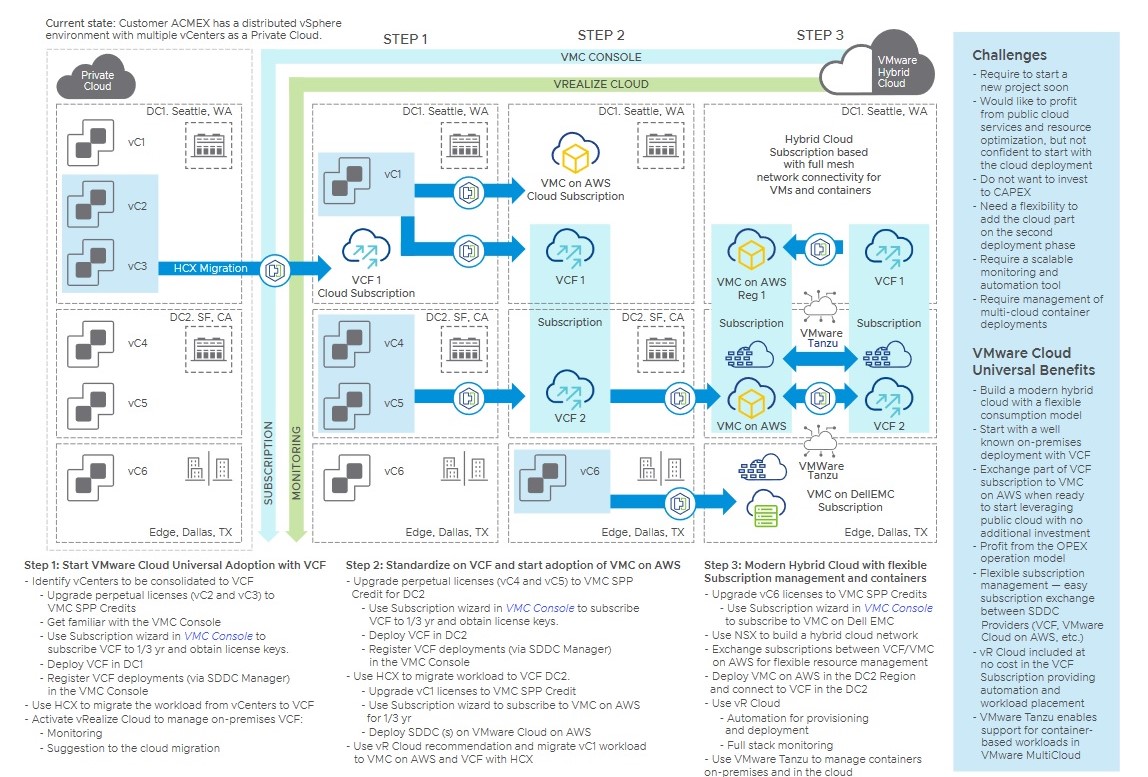VMware has unveiled what it is describing as VMware Cloud – a new compendium of tools that includes a single pane of glass solution for monitoring and managing environment for on-premises, AWS, and Dell EMC Cloud VMware workloads, and tweaks to licensing that allow “flexible subscription for consuming multi-cloud”.
“VMware Cloud” (seemingly a term only used in the press releases) is not VMware’s late entry to the hyperscaler party and a bid to build up its own IaaS in the mould of the aggressive strategy by fellow on-premises heavyweight Oracle to ramp up its own data centre/cloud footprint around the world.
Rather, it is three offerings for customers running workloads and applications across complex hybrid environments. At their heart is a common pool of subscription credits, which can be redeemed towards the new "VMware Cloud Foundation Subscription", VMware Cloud on Dell EMC, or VMware Cloud on AWS respectively.
As Richard Munro, VMware's global cloud strategy director puts it pithily to The Stack: "If you think about the world before you might have said, 'look, I've got this many licences, for software that I'm allowed to use in my data centre. Now, as I start using the service in AWS, I need licences for that as well. And I need some management licences. And my balance between those two worlds is going to shift over time."
Follow The Stack on LinkedIn
"[Previously] that would involve saying, 'well hang on a minute, because those licences are committed; now I need new licences over here'. And so you just end up with licences in the wrong place. So it's basically a highly flexible licencing option that flexes as you flex where you're deploying your services. It removes that those standard process challenges around saying, well, I was running here now I'm running there...'
A trio of offerings falls under the broad VMware Cloud rubric. These include:
- VMware Cloud Universal: “a flexible subscription that simplifies the purchase and consumption of VMware multi-cloud infrastructure and management services.”
- VMware Cloud Console: “a single monitoring and management environment for VMware Cloud infrastructure regardless of where it’s deployed.”
- VMware App Navigator: “a new offering for assessing and prioritizing app transformation initiatives across an entire application estate based on the value of each app.”
Not everyone was convinced by the launch, which featured migraine-inducing levels of software-company guff. (The promise to "Discover VMware Cloud Universal" meanwhile was thwarted by a link returning a 404 error.)
"It looks like a marketing campaign to rebundle existing things in a different price to make it 'easier' for existing customers to adjust their usage and stay on the platform. I don't see non-VMware people touching this' one grumpy CTO told The Stack, saying "it's a land grab -- from existing customers to own 'cloud' to add another confusing option to cloud procurement in complex orgs; 'why should we do X when VMware now offer Y"'?
They added: "I just had a call from a VMware user in the US who said he can't get an Not For Resale (NFR) license for one part of the VMware Cloud Universal, never mind the whole bit."
The CTO added that the associated product sheet -- despite referring to new abilities that give "customers the flexibility to extend their infrastructure on-demand to the public cloud for burst capacity requirements to respond to business needs or to deal with peak IT demand during the terms of service" -- came with no clear pricing/licensing details/a calculator other than a note suggesting it licensed per CPU.
"VMware Cloud customers can realize substantive benefits including as much as 80% better developer productivity with VMware Tanzu Application Service, 59% lower operational costs, and 46% faster cloud migration", VMware said: pointing to Forrester and IDC reports sponsored by VMware.
Pressed on cost transparency, VMware's Munro said: "Having an edge device, running in a dark site, is a very different beast to a service running, scaling up and down and flexing within the AWS data centre. It's not necessarily particularly easy to provide detail without... a lot of detail [about a given workload/architecture].
He added: "We're simplifying the technology, we're simplifying the commercial constructs; there is process change [happening across customer estates]. With VMware Cloud Universal, you [also] get access to the VMware Success 360 programme. This is effectively where we work very closely with our great customers; best practices on transformation journeys are being made available with guidance, workshops, etc, to help customers."

Having that single monitoring and management environment for VMware across on-prem, AWS, or Dell EMC environments sounds useful for customers. When will it be available across other clouds?
As VMware's Munro noted: "The services that we're talking about are those supplied directly from VMware: VMware cloud on AWS is actually a service that is billed inside VMware. [Azure] VMware Solution, as an example, is a service that is procured directly from Microsoft. Both very valid, great services. But they're effectively retailed from different sources. So these services [at launch] are the ones that are direct from VMware.
He added: "This is a really exciting, highly transformative model. As with anytime you do new at this scale, there's a lot that you just need to learn about. [This is easier in the areas where we] have direct representation, and where we can take the learnings or we can refine the models and so on. We are not able to ever speculate on on future commercial relationships, of course… But obviously we are constantly, constantly innovating in our partnerships across the cloud industry in a number of ways, including how our commercial offerings work."








